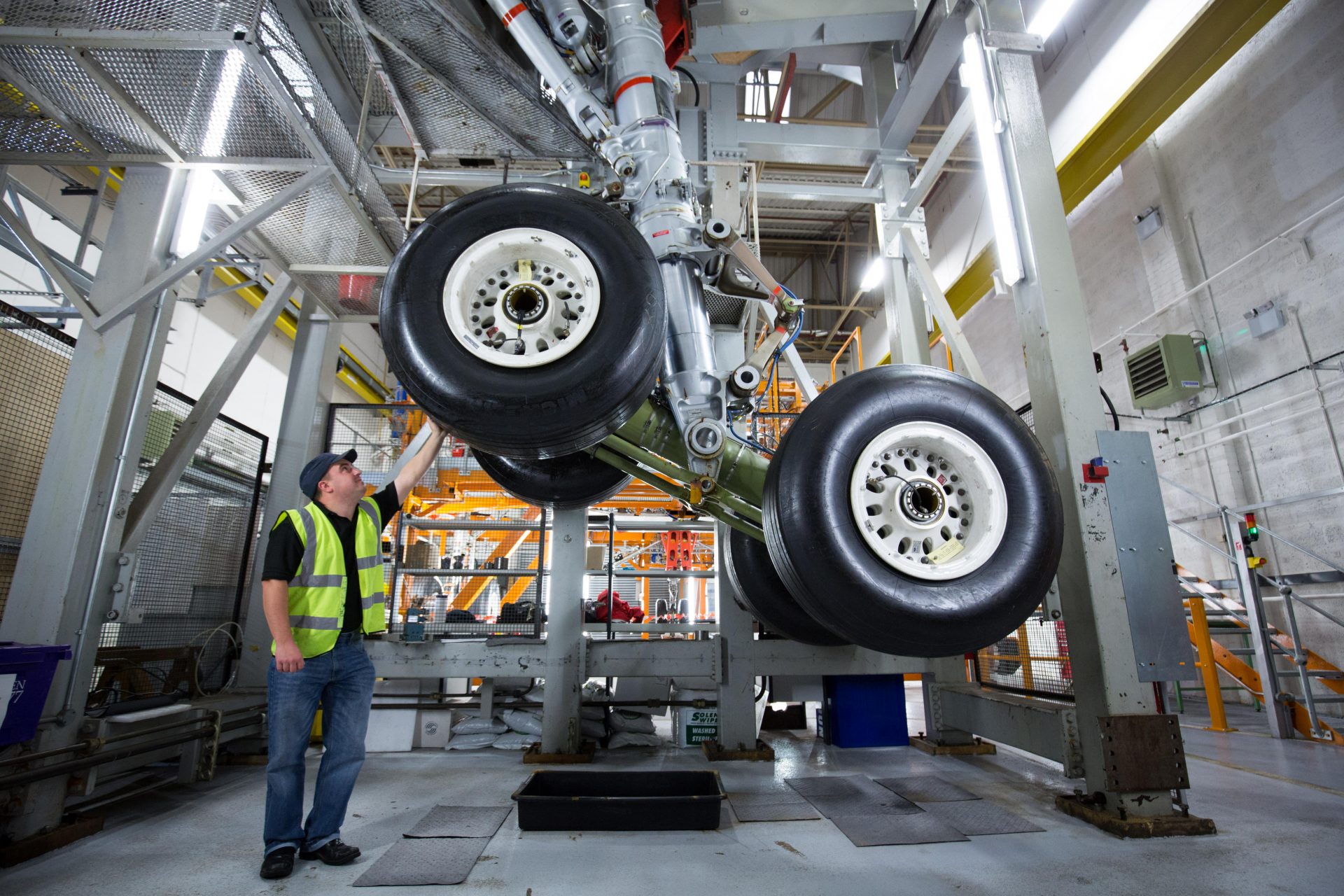I’m high up on a gantry in Airbus’ Filton plant in Bristol with the head of their ‘wings of tomorrow’ project, Sue Partridge. We stare down on a wing of today, undergoing a stress test, clamped in a giant machine. Up and down, up and down it goes, with a steady rhythmic grace. It is simulating thousands of take-offs and landings, mimicking the life-cycle of an aircraft to assess the effect of fatigue.
In aerospace avoiding nasty surprises is all-important, but Airbus has been through something of a stress test of its own since the beginning of the year: Brexit.
I am in Bristol as part of a programme for BBC Radio Four, Trading Blows?, taking a snapshot of some industries seven months after this huge change to the way Britain does business.
Airbus is a pan-European giant almost designed to embody the virtues of smooth cooperation across frictionless borders. So it isn’t surprising it used to be very vocal about the potential dangers of Brexit.
In 2019, the then CEO of the whole group, Tom Enders said the British government’s handling of it was “a disgrace”, and urged people not to listen to what he called “the Brexiteers’ madness” in proclaiming that Airbus would always stay in the UK. “Make no mistake,” he warned. “There are plenty of countries out there who would love to build the wings for Airbus aircraft.”
But that was about the prospect of a no-deal Brexit, and Airbus dodged that bullet. Now the company seems curiously sanguine.
The giant machine slowly flapping the single wing makes a curiously hypnotic, calming, sound for a test designed to induce stress, and Airbus’ attitude towards the fracture that was Brexit now seems similarly soothing. Sue Partridge tells me: “I think Brexit was a risk to us, but now that risk is behind us. And now really, in terms of the relationship on the technology side of things, Brexit really isn’t playing a part in any of our ongoing activities with the UK government.”
The government boasts that aerospace is the jewel in the crown of our exporting industries. But if Britain needs Airbus, Airbus needs the British government. Half the £40m for their brand new Integrated Research and Development centre in Filton comes from the taxpayer.
Just around the corner, there is the lure of lucrative government contracts: there’ll be new helicopters for Customs, new military satellites and technology needed for the UK’s participation in the next generation space race.
In the London of HQ of Airbus, its UK chairman John Harrison echoes the company’s new-found emollience towards Brexit. “When it actually happened we were well prepared and we’ve had a few teething problems. But I think that I would say Brexit is behind us. It’s something that we don’t really talk about anymore.”
They may not talk about it, but is he really saying Brexit is having no impact? “No, it’s not having any material impact. There are little annoying things.
“For example, if we have a party of UK engineers who are going to repair a wing that’s been damaged in Hamburg, the visa status, the 90 days out of 180 and the bureaucratic requirements in the different countries can be a bit painful. But we pass the messages to our governments and say ‘you’ve got to help us so that we can have frictionless and smooth trade and people travelling freely’. We’re totally committed to the UK. Perhaps the paranoia that we were going to up sticks was exaggerated.”
Paranoia summoned by Airbus themselves, remember. How did they go from ‘we might leave’ to ‘Nothing to see here’? Could it be that now it pays to play nice – or were they just trying it on before – crying wolf?
“What we were expressing was we need to know what the future holds for us because we’re making massive investments,” says Harrison. “Who cares what people think, whether we cried wolf or not… We look at every business opportunity as a business opportunity. You’re approaching it from a political angle. And I’m not a politician. I’m a businessman.”
That’s an important point to remember – clash and struggle is the nature of politicians, while businesspeople make the best of the reality they are faced with, and then seek the next opportunity.

Big companies will of course pile on the pressure if they think they can influence policy, but now Brexit is an unalterable reality they are inclined to sound optimistic and not risk offending. It is part of a trend in this industry.
There is little doubt that Northern Ireland Protocol is causing problems for the 90 or so small aerospace firms there – but neither they nor the trade body are keen to complain too loudly, even though it will cost them an estimated £65m in extra administration costs alone. There’s no doubt it is in Airbus’ interest to get along with the government – but there’s a simpler point too.
Harrison was in charge of Airbus’ steering committee on Brexit. Three years ago, he put well over a hundred people to work preparing for disruptions. They came from ten different departments and worked out what problems they might face and attempted to solve them.
It is a very different story for small companies who don’t have the money or staff to devote to such a project. What might be a minor irritation for Airbus is a major headache for Austin Jarrett. He’s the boss of Allets in Stafford who make lawnmowers – ten thousand machines, a quarter of them destined for the European market.
Austin happily describes his clients as “fanatics” who want perfect striped gardens. He also sells professional models, costing around £12,000, to the likes of Lords.
The company employs 45 people, but when we visit, Austin tells us that is soon to become 46 – he needs to take on an extra person to cope with what he calls the “hell” of post-Brexit red tape.
“I’ve got senior people in my business who are saying they’ve got more paperwork in the last five months than they did in the previous five years, as far as exports are concerned. And our biggest problem is, is that each country is translating the regulations differently.”
He’s got plenty of horror stories: the lorry held up for four weeks by Polish customs, double- and triple-checking that British safety markings still match EU requirements on the exact same machines with the same standards they’ve exported for around 30 years; the driver turned back at a border who had to take a single lawnmower all the way back to Stafford because of mistakes in paperwork. It wasn’t even their paperwork.
A frequent problem for small companies is that they are exporting one or two of their products at a time, so one lorry ferries goods from many different companies. In this case, someone forgot to put brackets around a number. Over fussy, even deliberately obstructive continental customs, to be sure, but they are getting used to a new world too.
Austin is frustrated and is willing to say so – after all the government is not on the verge of buying a fleet of his lawnmowers or investing in a new testing facility. “We voted to be a separate country from the rest of Europe and now we’re getting bogged down in paperwork on export. And in fact, it’s more difficult now to export to France or the Czech Republic than it is to export to America or Australia.”
Perhaps Brexit could give them a new cutting edge with all those lawn fanatics. After all one of the promises of Brexiteers was doing things our own way – the Daily Mail declared we’d be able to scrap burdensome red tape and make and buy more powerful vacuum cleaners, higher wattage light bulbs and so on – that goes for lawnmowers too. Has that dream come true? In a word, no.

In fact, the government has chosen to plonk existing EU regulations into British law lock stock and barrel – nothing has been changed. And Austin wouldn’t want it any other way – both for safety and business reasons. “I don’t want those rules to change, because if you start giving me different rules for the UK than in the rest of Europe, I’ve now got to have two models of lawnmower I’m working in a market environment, and I need everything to be as the same as possible,” he says. “So that I’m only working to one set of legislation and rules. Doubling my models of lawnmower is not going to be very good for my efficiency, for the complication of the manufacturing of these products.”
The old EU standards are now British law but this doesn’t smooth the passage into Europe. To be compliant with EU rules the noise level tests can’t be done in the UK anymore – he now has to go to a Belgium-registered firm and that cost five times as much.
Such minor irritations for business are unlikely to move those who were enthusiastic about Brexit. It was about many things – sovereignty and identity above all – and in all honesty, few argued very hard that it was about giving our country a sharper economic edge. Remember what the current prime minister said when asked about businesses complaints? It was rude, brief and Anglo Saxon.
Businesses by their nature try to work around problems the world throws at them. Of course, they will try to affect policy in advance, but there’s little mileage in moaning too much about things they aren’t able to change, especially if it risks offending a government they need.
Our snapshot suggests Brexit has created plenty of extra red tape at the borders for exporters which are much easier to solve the more clout a company has — the big beasts can navigate the new environment with greater ease than the little guy. It may not have been the declared intention, but post-Brexit big is better, and it has cost even the giants of industry time and money.
The one positive potential advantage for many companies is the possibility of trade deals outside the EU, which might give them lower tariffs. Austin is always looking for new markets – when we visit Stafford machines are lined up ready for export to Beijing to help with China’s World Cup ambitions. Australia is now his third most important market.
He hopes the trade deal will help him even more in that land of cricket pitches and bowling greens, and that the planned India deal will cut tariffs that make it much harder to compete now in that potential lucrative market. So, I ask him – is he willing to say that Brexit may not be all bad?
“The short answer is ‘no’ if it’s just going to sort out those couple of trade deals, for me, that’s not enough to compensate for the trouble that we’re having now and the potential loss of my dealers and distributors in Europe, that are just saying it’s going to be too difficult to deal with you from England now. It’s not allowing me to run my business very smoothly. That hurts.”
Hurt is a good word. Many small export businesses see Brexit as a bruising experience, if not a life-threatening one. It is hard to judge the true impact when Covid has done so much damage to the economy.
Leaving personal political preferences aside, few businesspeople see Brexit as anything other than an annoyance to be worked around – teething problems maybe. But as every parent knows, while teething problems are never fatal, they mean pain, worry and anxious sleepless nights – and can go on for quite some considerable time.
- Mark Mardell’s documentary Trading Blows? is available on the BBC website



